View in other NatureServe Network Field Guides
NatureServe
Montana
Utah
Wyoming
Idaho
Wisconsin
British Columbia
South Carolina
Yukon
California
New York
Cylindrical Vertigo Snail - Vertigo binneyana
General Description
A small shell, about 1.1 mm diameter and 2.1 mm in height, subcylindrical (pupiform) and tapering, weak and irregular axial striae, about 5 whorls. Shell coloration is translucent reddish-brown and glossy. Aperture subovate, with six teeth (denticles: parietal, columellar, lower palatal, upper palatal, angular, infrapalatal), a moderate palatal callus, a weakly indented sinulus, a crest behind the lip. The original description was based on specimens collected about 1890 at Helena (Hendricks 2012, Burke 2013).
Diagnostic Characteristics
Combination of size (height < 3.0 mm) and shape, presence of teeth in a subovate aperture, 4-5 whorls, and an indentation in palatal lip distinguish Vertigo from similar appearing shells. Combination of weak or absent sinulus, moderately developed palatal callus, shell height < 2.2 mm (2.1 mm for this species), and aperture with 6 teeth differentiate this from the similar V. gouldii.
Species Range
Montana Range
Range Descriptions
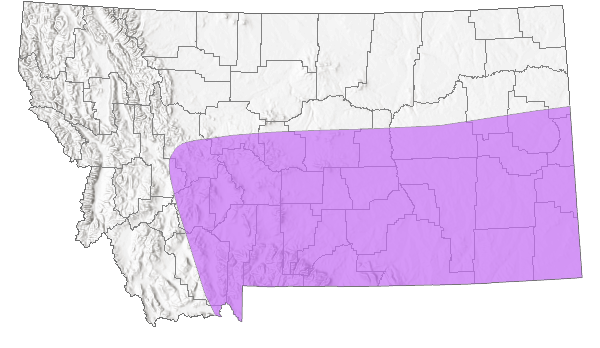
 Native
Native
Range Comments
North America scattered across Alberta, Manitoba, New Mexico and Montana. In Montana, six records east of the Continental Divide from five counties: Dawson (1), Gallatin (1), Lewis and Clark (1), Wheatland (2), Wibaux (1). Elevation range is 640 to 1890 m (2100 to 6200 ft). Range and abundance in Montana are poorly defined, and no contemporary records exist; current status needs investigation. May be relatively common at some locations; 88 (7 live, 81 shells) were reported at the Wheatland County site (Hendricks 2012).
Observations in Montana Natural Heritage Program Database
Number of Observations: 7
(Click on the following maps and charts to see full sized version)
Map Help and Descriptions
Relative Density
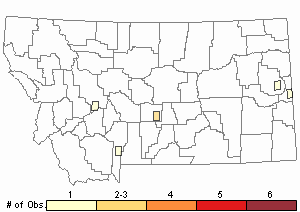
Recency
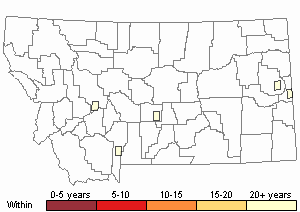
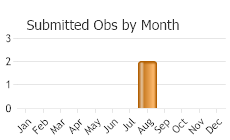
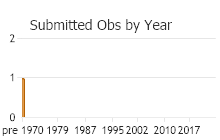
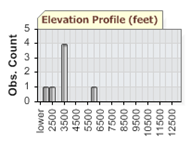 (Observations spanning multiple months or years are excluded from time charts)
(Observations spanning multiple months or years are excluded from time charts)
Habitat
Moist sites with a canopy of plains cottonwood; found under woody debris, rocks, and in leaf litter. Alberta records are from sites with forest canopy including Engelmann spruce, lodgepole pine, Douglas-fir and aspen. Habitat in Montana poorly described (Hendricks 2012).
Stewardship Responsibility
References
- Literature Cited AboveLegend:
 View Online Publication
View Online Publication Burke, T. E. 2013. Land snails and slugs of the Pacific Northwest. Corvallis, OR: Oregon State University Press. 344 p.
Burke, T. E. 2013. Land snails and slugs of the Pacific Northwest. Corvallis, OR: Oregon State University Press. 344 p. Hendricks, P. 2012. A Guide to the Land Snails and Slugs of Montana. A report to the U.S. Forest Service - Region 1. Montana Natural Heritage Program, Helena, MT. vii + 187 pp. plus appendices.
Hendricks, P. 2012. A Guide to the Land Snails and Slugs of Montana. A report to the U.S. Forest Service - Region 1. Montana Natural Heritage Program, Helena, MT. vii + 187 pp. plus appendices.
- Additional ReferencesLegend:
 View Online Publication
View Online Publication
Do you know of a citation we're missing? Berry, S.S. 1913. A list of Mollusca from the Mussellshell Valley, Montana. Nautilus 26:130-131.
Berry, S.S. 1913. A list of Mollusca from the Mussellshell Valley, Montana. Nautilus 26:130-131. Berry, S.S. 1916. Notes of Mollusca of central Montana. Nautilus 29:124-128.
Berry, S.S. 1916. Notes of Mollusca of central Montana. Nautilus 29:124-128. Forsyth, R.G. 2004. Land snails of British Columbia. Royal British Columbia Museum: Victoria, British Columbia, Canada. 188 pp.
Forsyth, R.G. 2004. Land snails of British Columbia. Royal British Columbia Museum: Victoria, British Columbia, Canada. 188 pp. Harris, S.A. 1978. Vertical zonation of land snails in the Iraqi slopes of the Persian Mountains and in the Rocky Mountains of Alberta, Canada. Arctic and Alpine Research 10:457-463.
Harris, S.A. 1978. Vertical zonation of land snails in the Iraqi slopes of the Persian Mountains and in the Rocky Mountains of Alberta, Canada. Arctic and Alpine Research 10:457-463. Henderson, J. 1924. Mollusca of Colorado, Utah, Montana, Idaho, and Wyoming. University of Colorado Studies 13(2):65-223.
Henderson, J. 1924. Mollusca of Colorado, Utah, Montana, Idaho, and Wyoming. University of Colorado Studies 13(2):65-223. Pilsbry, H.A. 1948. Land Mollusca of North America (north of Mexico), Volume II Part 2. The Academy of Natural Sciences of Philadelphia Monograph Number 2(2): 521-1113.
Pilsbry, H.A. 1948. Land Mollusca of North America (north of Mexico), Volume II Part 2. The Academy of Natural Sciences of Philadelphia Monograph Number 2(2): 521-1113. Squyer, H. 1894. List of shells from the vicinity of Mingusville, Montana. The Nautilus 8:63-65.
Squyer, H. 1894. List of shells from the vicinity of Mingusville, Montana. The Nautilus 8:63-65. Sterki, V. 1890a. On new forms of Vertigo. Proceedings of the Academy of Natural Sciences of Philadelphia 42:31-35.
Sterki, V. 1890a. On new forms of Vertigo. Proceedings of the Academy of Natural Sciences of Philadelphia 42:31-35. Sterki, V. 1890b. On Some Northern Pupidae, with Descriptions of New Species. The Nautilus 3:123-126.
Sterki, V. 1890b. On Some Northern Pupidae, with Descriptions of New Species. The Nautilus 3:123-126.
- Web Search Engines for Articles on "Cylindrical Vertigo Snail"
- Additional Sources of Information Related to "Snails / Slugs"





